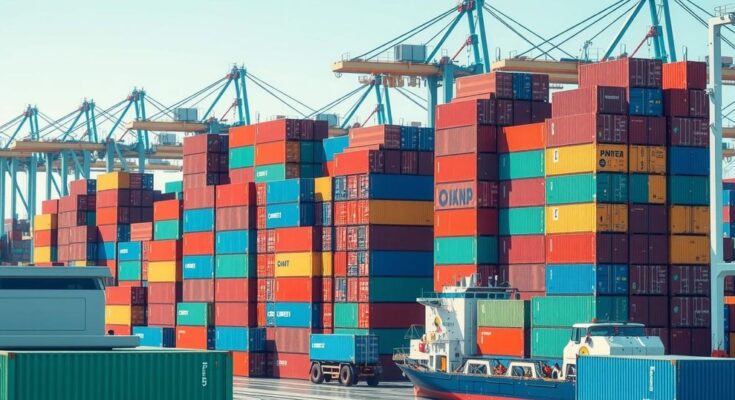Indian exporters are lobbying for an exemption from U.S. reciprocal tariffs to enhance bilateral trade. They argue that tariffs would adversely impact shipments to the U.S. Discussions for a Bilateral Trade Agreement are underway, aiming for completion by fall 2025, despite skepticism surrounding the likelihood of tariff exemptions. Key trade statistics highlight significant export and import figures between the two nations.
Exporters in India are advocating for an exemption from the reciprocal tariffs to be imposed by the United States, arguing that such an exemption would facilitate smoother bilateral trade. They assert that any tariffs on Indian goods could hinder shipments to the U.S., adversely affecting trade relations. Reports indicate that U.S. President Donald Trump has signaled that automobile tariffs will soon be introduced but may exempt certain countries from the upcoming tariffs set to take effect on April 2.
The Federation of Indian Export Organisations (FIEO) emphasizes that India merits this exemption due to its constructive engagement with the U.S. at various levels and ongoing discussions regarding a Bilateral Trade Agreement. FIEO Director General Ajay Sahai pointed out that the goal of increasing bilateral trade from approximately USD 200 billion to USD 500 billion requires initiatives that ease trade barriers. An exemption from reciprocal tariffs would be one such initiative.
An exporter commented that granting India an exemption would alleviate tariff uncertainties and potentially boost exports to the U.S. Currently, the U.S. has already instituted high tariffs on imports from China. However, the Global Trade Research Initiative (GTRI) posits that it is improbable for India to receive an exemption from the tariffs instituted under Trump’s administration, primarily due to Trump’s characterization of India as a “high-tariff” country.
GTRI Founder Ajay Srivastava noted, “Any exemption would come at a steep cost,” suggesting that Trump would likely demand extensive concessions from India that extend beyond trade. These concessions might involve permitting operations for Starlink, simplifying Tesla’s entry into the market, amending the civil nuclear liability law, and eliminating the equalization levy imposed on U.S. technology firms. Srivastava advised that India must not yield on critical strategic issues, stating, “If Trump imposes tariffs, so be it. India is not alone. The whole world is watching India.”
As negotiations for a Bilateral Trade Agreement between India and the U.S. commenced, officials from both countries including Assistant U.S. Trade Representative for South and Central Asia Brendan Lynch participated in discussions with Indian officials. The objective is to complete the initial phase of the trade agreement by the fall of 2025. The U.S. has urged for increased market access in specific sectors while India is considering tariff reductions for labor-intensive industries such as textiles.
In 2024, key Indian exports to the U.S. included drug formulations and biologicals valued at USD 8.1 billion, telecom instruments at USD 6.5 billion, and precious stones at USD 5.3 billion. Notable imports from the U.S. included crude oil valued at USD 4.5 billion and electric machinery at USD 1.4 billion. Moreover, imported petroleum products and coal also constituted significant portions of trade, highlighting the interdependence of both nations in various sectors.
The discourse surrounding the potential exemption of India from U.S. reciprocal tariffs underscores the complexity of international trade relations. Exporters advocate for this exemption to enhance bilateral trade, while economic analysts remain skeptical given the current political climate. The ongoing negotiations for a Bilateral Trade Agreement, along with the strategic decisions regarding tariffs and market access, may define the trajectory of trade relations between India and the U.S. in the coming years.
Original Source: www.livemint.com




